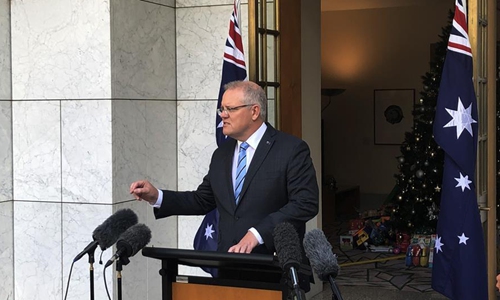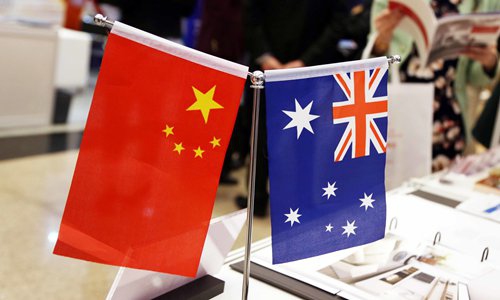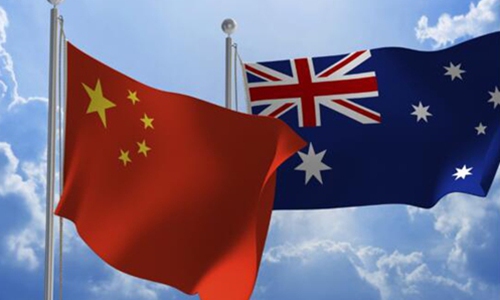
Australian Prime Minister Scott Morrison Photo: Xinhua
Chinese academics are urging the Morrison government to stop extreme groups like the Wolverines and politicians and commentators from spreading the US' anti-China virus.
Unless this happens, Australia could find itself involved in a China-US "Cold War" due to cheap tricks from second-rate politicians who play the China card while hurting bilateral economic cooperation and trade amid COVID-19, experts noted.
Extreme anti-China group
The Wolverines, a secret bipartisan group, consisting of Australian members of parliament (MPs) who take a hawkish line on China, has been coordinating messages and making noise to stir hatred against China, sources said. Chinese academics have criticized the Wolverines for exacerbating hostility against China.
The most recent example is Australian Liberal Senator James Paterson, who has stuck his nose in Hong Kong affairs. Paterson, who is reportedly a member of the Wolverines, criticized China's "one country, two systems" policy, the Sydney Morning Herald reported.
The anti-China group has allowed itself to be used by US President Donald Trump to sell his COVID-19 conspiracy theories. According to a report of The New York Times on Australia's call for a global coronavirus inquiry, another Wolverine, MP Andrew Hastie urged Australia to "build a coalition of like-minded nations."
"To act on the global stage as a middle power, you need to do it from a position of strength," said the Australian Parliament backbencher who leads the Joint Committee on Intelligence and Security.
The Sydney Morning Herald reported last year that Hastie had gone even further by comparing China's ascension with that of Nazi Germany's.
Wolverines like Hastie's extreme ideological rhetoric are missing the point. The key to whether Australia can grow as a middle power on the global stage rests with its ability to maintain good relations with China, Wang Shiming, professor with School of Advanced International and Area Studies of East China Normal University, told the Global Times.
Australia's Prime Minister Scott Morrison distanced himself from Hastie since his article was published. However, Yu Lei, a chief research fellow at the Research Center for Pacific Island Countries with Liaocheng University, told the Global Times that Canberra is indulging the Wolverines, not supporting yet, but obviously indulging.
Wang said that Morrison might have not realized that keeping the China-Australia ties on track should be the chief priority for the country to achieve its middle power ambition.
US instigation
The name of the anti-China group may be a reference to the US film "Red Dawn," where high school football stars Patrick Swayze and Charlie Sheen fight a Soviet invasion on US soil, the Australian reported.
According to the report, even amid a raging coronavirus pandemic, Hastie and Labor senator Kimberley Kitching were seen at the US Embassy having dinner with the US Ambassador to Australia, Arthur B Culvahouse Jr.
Culvahouse was made an honorary member of the Wolverines and was even given their secret code - a small sticker with four claw marks, the report said.
It's clear that this group, made up of backbenchers in Australian politics, is pursuing their political interests rather than Australia's national interests, and their extreme anti-China approach is closely related with the US' instigation, Liu Qing, director of the Department for Asia and the Pacific Study at the China Institute of International Studies, told the Global Times.
Yu noted that the Wolverines' extreme anti-China stance has a clear purpose. "They hope to stand out in the US-China tensions and attract the attention of the US. Only in this way will there be a lot of funds during the campaign," Yu said.
"The relationship between Australia and the US is very close in every way. It is an open secret that anti-China groups like the Wolverines could be used to undermine relations between China and Australia at the behest of the US," Ruan Zongze, executive vice president and senior research fellow at the China Institute of International Studies, told the Global Times.
These anti-China lawmakers are motivated by their interests and are happy to be thugs of the US to enhance their presence without considering China-Australia relations or Australia's interests, Ruan said.

China Australia File photo
China-Australia relations
As a member of the Five Eyes, Australia is following the US in terms of foreign affairs, but its indulgence in extreme anti-China rhetoric is concerning, said Qian Feng, director of the research department at the National Strategy Institute at Tsinghua University. Qian noted that Australia's businesses are hurt and complaining.
If Australia allows such negative powers to hurt China-Australia relations, irreversible damage will be caused to economic cooperation and trade with China, and would hammer Australia's interests amid the coronavirus fallout, Liu said.
"The Morrison government should release more positive signals to restore bilateral ties with China. If Australia can make more concrete efforts, the bilateral ties could be brought back on track," Liu noted.
All rational people understand that under the impact of the pandemic, Australia should not push China, which is its largest trading partner at this juncture, Mei Xinyu, a trade expert close to the Ministry of Commerce, told the Global Times.
China has been tolerant and only hopes that sound and mature minds within the Australian government can stop the words and actions of such immature anti-China groups, Mei said.
But if China is forced to implement countermeasures, China would target the extremely anti-China Australian politicians and their related forces, Mei added.
"The current tension between China and Australia is mainly due to Australia's initiative and provocation, which China is sure to respond to. However, it is not necessarily an economic reaction because China and Australia enjoy close trade relations and share common interests," said Ruan.

